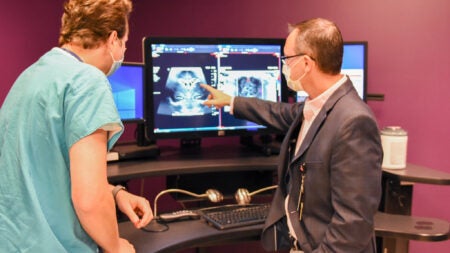Curriculum
The primary mode for resident education is on-the-job teaching at the PACS workstation during the sub-specialty rotations.
A core curriculum approach is applied in order to provide comprehensive coverage of important topics for resident training. This lecture/seminar schedule is on a two-year repeating basis.
Curriculum Highlights
Conferences are held three times per week at 7:15 am, and daily at 12:00 pm; these include grand rounds and visiting professors, joint ENT/Neuroradiology conference, Chairman’s teaching file conference, and radiologic-pathologic correlation conference
- Upper-level residents deliver two resident conferences in the fourth year
- Every resident attends the American Institute for Radiologic Pathology (AIRP) in the third year; tuition is provided
- Physics is integrated into conferences as well as residents being assigned specific modules based on rotation
- Interactive educational websites and software are available for independent learning
Each resident receives a General Allotment for the purchase of educational materials, and a separate travel fund for meetings.
Core Curriculum
All Areas (except Body Imaging)
- Core Curriculum Chart & Overall Educational Goals (pdf)
- Overview of the Core Curriculum Goals (pdf)
- Angiography, Interventional Radiology, and Special Procedures (pdf)
- Breast Imaging (pdf)
- Musculoskeletal (pdf)
- Noninvasive Cardiovascular Imaging (pdf)
- Nuclear Medicine (pdf)
- Neuroradiology (pdf)
- Obstetric Ultrasound (pdf)
- Pediatric (pdf)
- 1232 Senior Call (pdf)
- 1404 Night Float (pdf)
- 1590 Night Float (pdf)
Night Float
Resident Leadership Opportunities
Once every two years the department selects a resident quality officer from a pool of interested applicants. This resident will be mentored by the department’s Vice Chair of Quality and will work closely with the Director of Quality Assurance and Compliance in crafting the quality and safety curriculum for our residency programs and our department. In addition, this individual will help ensure that our trainees complete their quality improvement projects. Opportunities to conduct research in quality and safety, many of which leverage AI tools, will also be made available to residents interested in pursuing this type of research. Extensive opportunities to participate in national quality and safety meetings and network with residents and faculty across the country are additional benefits of this position.
The selected individual will be granted academic time commensurate to fulfill the roles and responsibilities of this position.
This position is granted to a resident (R1 – R3 years) who demonstrates interest in and an aptitude for the role of technology in radiology. Our IT officers have helped transform this concept into the Education Portal on the UVA Radiology Intranet, which provides for a central organizational system to manage resources for the residency program.
In addition to working with attendings from various divisions to help maintain and keep the Education Portal up to date, the IT officer participates in other ongoing IT-related projects within the department. Examples of this include being part of the physician teams in PACS consulting matters, dictation software or report tracking tools. Other related responsibilities include maintaining access to and proper operation of Panopto, the program’s lecture recording software, just as one example.
The IT officer is mentored by and works closely with the department’s Vice Chair of Clinical Operations and Informatics and counts with commensurate academic time to fulfill their responsibilities. This position also opens the opportunity to join faculty on IT-related business trips, such as visiting the Siemens research offices to learn more about the role of AI in medicine and radiology.
Supported by the de Lange Diversity and Inclusion Fund, we offer a leadership position to residents who have an interest in enhancing diversity and inclusion in the field of radiology, joining the efforts of the department in this area during their residency training. A Resident Representative is chosen from each residency class and is expected to help lead and contribute to departmental and institutional efforts to promote diversity, inclusion and a culture of respect in the workplace environment and community.

